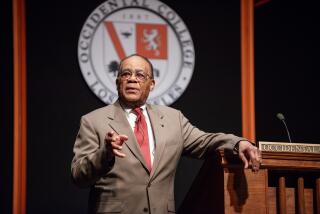Robert E. Marshak; Worked on A-Bomb
- Share via
CANCUN, Mexico — Robert E. Marshak, a physicist who helped develop the atomic bomb and led the City College of New York during the 1970s, drowned while on vacation in Cancun, officials said Thursday. He was 76.
Marshak apparently swam too far from shore Wednesday at the Yucatan peninsula resort city, said Rita Rodin, a spokeswoman for City University Chancellor Ann Reynolds in New York.
Marshak lived in Blacksburg, Va., where he was a distinguished professor emeritus at Virginia Polytechnic Institute. He was vacationing with his wife, Ruth, and their children and grandchildren.
Mexican authorities said an autopsy was planned.
Marshak was recently selected as the first recipient of an American Assn. for the Advancement of Science prize for fostering international scientific cooperation.
Most of his career was spent at the University of Rochester, N.Y., where he was chairman of the department of physics and chemistry.
In 1942, three years out of graduate school, he joined the atomic bomb project and eventually became a deputy group leader in theoretical physics at Los Alamos, N.M. He developed a theory of shock waves that became known as the “Marshak wave.”
He described himself as one of the many project scientists who did not believe the bomb would be used against Japan, but favored detonating the weapon in a demonstration to persuade Japan to surrender.
In the postwar years, he led efforts to make scientific contacts through the Iron Curtain. In 1970, he became president of City College. His predecessor, Buell Gallagher, resigned amid racial strife at the Harlem campus.
In the ensuing years, the college instituted a program to accept anyone with a high school diploma. But a fiscal crisis in 1975 forced a cutback in admissions and ended the 135-year tradition of free tuition.
When he stepped down in 1979, Marshak told friends he would not have accepted the presidency of any other college.
“This college was founded to help the socially disadvantaged and that’s what I wanted to do,” he said.
He returned to teaching and research at Virginia Polytechnic Institute. He became professor emeritus in 1987.
In addition to his wife of 39 years, Marshak is survived by a daughter, Ann Garland of Boston; a son, Stephen, of Champaign, Ill., and four grandchildren.
The funeral is scheduled for Sunday in Rochester.
More to Read
Sign up for Essential California
The most important California stories and recommendations in your inbox every morning.
You may occasionally receive promotional content from the Los Angeles Times.











